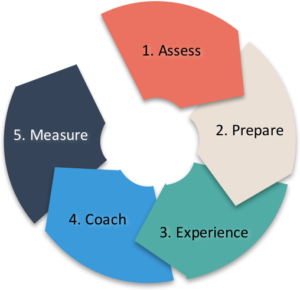EXPERIENTIAL LEARNING
In our training programs, we promote experiment and research to enable participants to build new perspectives and create the foundation for a sustainable change of habits. You can choose from our ready to learn catalogue. We will be glad to tailor or create new content to address your needs at best.
Experiencing on the skin improves the embodiment
“Scientific principles and laws do not lie on the surface of nature. They are hidden, and must be wrested from nature by an active and elaborate technique of inquiry.”
John Dewey, Reconstruction in Philosophy
In our training programs, we promote experiment and research to enable participants to build new perspectives and create the foundation for a sustainable change of habits.
Maximize the ROI on your training investment. Experiential training increases the impact on the individuals and thanks to our approach impact are anchored (coaching post learning) and measured (assessment before and after the event).

1. Assess (optional) – Participants are taking part in an assessment to correctly measure their current effectiveness, this assessment can be individual or team based and combines feedback from multiple stakeholders.
2.Prepare (optional) – Participants prepare themselves for the training. Since the training is essentially experiential, only key concepts are prepared before the training (theory, case study). Personal objectives can also be established at this stage.
3. Experience – During the training, the participants are exposed to simulation, role play, case study and games to build their own experiences in a safe environment where mistakes are welcomed. At the end of the session, participants discuss and share their findings, establishing their own personal strategies to be applied in a working environment.
4.Coach (optional) – The knowledge gained during the training is often difficult to implement in working environments as humans are hardwired to repeat familiar patterns. Coaching can be individual or in a group.
5.Measure (Optional) – At the end of the training, progress is assessed measuring the achievement of the personal and/or team objectives set. A review of the initial assessment is conducted with each participant and/or team.
Ready for VUCA:
Build personal, organizational and system mastery to effectively deal in a VUCA environment.
Building collective intelligence:
Leveraging on behavioural agility (acting together), the participants will learn how to build collective intelligence. With collective intelligence, 1+1=3 (or more); the difference between the mathematical sum and the final result is due to emerging characteristics of playing chords together.
The behavioural agility:
Learning how to adapt to the context more than to personal need for the greater good of all the involved stakeholders, leveraging on neurosciences.
Certification in Systemic Agility:
The certification in Systemic Agility will provide the participants with all the knowledge and tools to use the Systemic Agility index to support organizations to transform towards more agile forms.
Systemic agility for leaders:
How to leverage on Systemic Agility and its 6 domains to maintain its own context in check and maximize the outcome of the system for the greater good of all the involved stakeholders.
From transaction to transformational leadership:
It’s a fresher version of the theory X and Y developed by McGregor that take into consideration the globalized environment and the major changes that hit us during the last decade.
The consultant posture:
That’s not about learning tips and tricks to manage difficult cases, it’s a transformation program to change own perspective and embody the changes through improved presence, adapted action and communication, reading and adaption to the context.
Problem-solving, leveraging on creativity:
The program will lead the participants on a course of experiments to discover and identify the various type of problems that arise in today’s context, ranging from simple, complicated, complex and chaotic. They will establish the difference between best, good, emerging and novel practice through a number of simulation. The participants will be exposed to the system thinking practice to understand the nature of the system and ensure the effectiveness of their solutions.
Managing boundaries:
Am I aware of my limits? Where are there? Do I communicate them to my counterparties? Do my counterparties understand them? How can I leverage on my (known) limits as a starting point to growth? That’s a number of questions that are explored during that learning event. As an option, limits in corporations can be added to the program as a basis for negotiation and business development.
